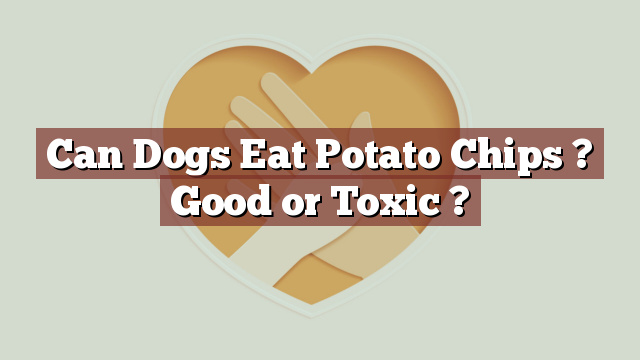Can Dogs Eat Potato Chips? Safe or Toxic?
The question of whether dogs can eat potato chips is a common concern among pet owners. While it may be tempting to share your favorite snack with your furry friend, it is important to consider their health and well-being. Knowing which foods are safe for your dog to consume is essential in maintaining their overall health and preventing any potential risks or complications.
Nutritional Value of Potato Chips
Potato chips are a popular snack enjoyed by many humans due to their crunchy texture and savory flavor. However, when it comes to nutritional value, potato chips offer very little benefit. They are typically high in unhealthy fats, sodium, and calories, while being low in vitamins, minerals, and fiber. As such, potato chips do not provide any essential nutrients that dogs require in their diet.
Can Dogs Eat Potato Chips? Safe or Toxic?
The answer to whether dogs can eat potato chips is no, they should not consume them. Potato chips are not toxic per se, but they can be harmful to dogs due to their high fat and sodium content. Dogs have different digestive systems than humans and are unable to efficiently process these types of foods. Consuming potato chips can lead to digestive upset, including stomach pain, diarrhea, and vomiting. Additionally, the excessive sodium in potato chips can cause dehydration and potentially lead to more severe health issues such as kidney damage or heart disease.
Potential Risks and Benefits of Dogs Consuming Potato Chips
While there are no inherent benefits to dogs consuming potato chips, there are several potential risks associated with it. As mentioned earlier, the high fat content in potato chips can lead to digestive issues. Dogs may also be at risk of pancreatitis, a condition characterized by inflammation of the pancreas. Furthermore, the excessive sodium in potato chips can have detrimental effects on a dog’s overall health and may contribute to long-term complications such as high blood pressure.
What to Do If Your Dog Eats Potato Chips
If you suspect or know that your dog has consumed potato chips, it is important to take swift action. First, do not panic. Assess the situation and the quantity of chips ingested. If your dog has only had a small amount, they may not experience any significant adverse effects. However, if your dog has consumed a large portion or exhibits symptoms such as vomiting, diarrhea, or abnormal behavior, it is vital to seek veterinary assistance immediately. A veterinarian will be able to thoroughly examine your dog and provide appropriate guidance and treatment if necessary.
Conclusion: Dogs Should Avoid Potato Chips
In conclusion, potato chips are not suitable for canine consumption. Dogs should not eat potato chips due to their high fat, sodium, and calorie content. While it may be tempting to share your snack with your furry companion, their health and well-being should always be prioritized. Instead, opt for healthier alternatives such as dog-friendly treats or fruits and vegetables that are safe for dogs to consume. Remember, it is essential to consult with your veterinarian regarding your dog’s diet to ensure they receive the proper nutrition they need to thrive.
Thank you for investing your time in exploring [page_title] on Can-Eat.org. Our goal is to provide readers like you with thorough and reliable information about various dietary topics. Each article, including [page_title], stems from diligent research and a passion for understanding the nuances of our food choices. We believe that knowledge is a vital step towards making informed and healthy decisions. However, while "[page_title]" sheds light on its specific topic, it's crucial to remember that everyone's body reacts differently to foods and dietary changes. What might be beneficial for one person could have different effects on another. Before you consider integrating suggestions or insights from "[page_title]" into your diet, it's always wise to consult with a nutritionist or healthcare professional. Their specialized knowledge ensures that you're making choices best suited to your individual health needs. As you navigate [page_title], be mindful of potential allergies, intolerances, or unique dietary requirements you may have. No singular article can capture the vast diversity of human health, and individualized guidance is invaluable. The content provided in [page_title] serves as a general guide. It is not, by any means, a substitute for personalized medical or nutritional advice. Your health should always be the top priority, and professional guidance is the best path forward. In your journey towards a balanced and nutritious lifestyle, we hope that [page_title] serves as a helpful stepping stone. Remember, informed decisions lead to healthier outcomes. Thank you for trusting Can-Eat.org. Continue exploring, learning, and prioritizing your health. Cheers to a well-informed and healthier future!

